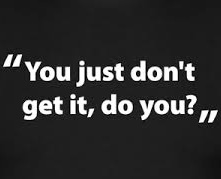by | Jun 5, 2014 | Uncategorised

Today, I spent an hour or so with a Business Owner who couldn’t see her way out of her long-standing business, other than to sell off the stock, the stuff really cheaply through eBay or GumTree or some such thing. So we spent time bringing me up to speed in terms of what she had to sell and we talked through her options. By the time I left, she had a complete change of focus and knew exactly what to concentrate on… and it had been under her nose the whole time.
But as you know, when you’re in it, sometimes it’s really hard to see what others see.
It’s really hard to see what others will value. Especially if the stuff has been a part of your life for a long time.
Given the business is in a dying trade, the value of what was once regarded so highly is no more.
Very sad really because once the gems of this trade are gone, they will not be able to be redeemed. The collective memory will die out with the current memory holders, which is happening already.
So with that in mind, she was prepared to throw caution to the wind, advise that there will be a Sale on a particular date and take whatever eventuates. Now, for 80% of the stock, this will probably be the right course of action. As for the remaining 20%, there is Gold in that stuff!
Sometimes, it doesn’t make sense to try and hang onto the whole if some of the parts are worthy of full-blown lights, action, camera. If marketed to the right buyer, the valuable items should fetch a handsome sum, negating the need to do too much with what’s left.
What have you got in your business that would be deemed valuable to others, even if not to you?
Where is the Gold worth mining?
by | Jun 3, 2014 | Uncategorised

If given the chance, I’m sure you know of someone in business you want to say, “you just don’t get it, do you?” too.
What usually happens though is that what’s said behind closed doors is instead, “they just don’t get it, do they?”.
A case in point was today. I spent it working with a friend and colleague of mine, who owns a franchise business reliant on independent practitioners. Together with her business development colleague, we went over a number of scenarios to improve the booking rates of her practice. But the one phrase that was repeated over and over again was “they just don’t get it” in respect to their franchise comrades.
The main reason for this was due to the level of frustration directed at the independent practitioners who were generally not deemed to be business savvy. It was agreed it’s because they were/are not taught about the principles of business when at practitioner school and nor do they have someone around them, in their “A” team, that can assist with the transition either.
Typical eMyth stuff!
That said, it does not help the business owner who is trying to build a business based on the practitioners skill set.
So what do you do?
Do you interview many of them, in the hope that a select view will drop out of the mix as the ideal type of candidates or do you invest in training all of them to be better at the business of their craft? Regardless of choice, the fear is they will learn what they have to and before too long, may decide to leave and go out on their own, leaving you, the business owner, right back where you started.
So what other option do you have?
Maybe it needs to be built more on a Cooperative model? Or even a Legal Practice model?
There has to be some way for the practitioners to comprehend the commercial realities along with their own need to earn.
Given that in this particular scenario, the franchise model has already been cast, the franchisor is going to have to work really hard to bring the franchisees up to speed or otherwise the whole thing could fall over. And that won’t do anyone any good.
Would the same decisions be made today, based on what they now know?
I suspect not…
by | Jun 2, 2014 | Uncategorised

“The unspoken beliefs that wield the most influence over business behavior are the metaphors that people use to envision the following major aspects of the work experience:
- What is business all about?
- What is a corporation all about?
- What is management all about?
- What role do employees play?
- What really motivates people?
- What is the nature of change?
- What’s the role of technology?
- What is the essential nature of work?
The answers to these questions define a company’s corporate culture. So, then, what type of culture allows companies to pursue strategies that work today? What makes a corporate culture smart, given today’s business environment?
A good way to answer these questions is to compare what the executives inside successful companies believed in the past as opposed to what executives inside successful (i.e. smart) companies believe today. Here’s what ‘smart’ cultures believe … ”
What’s the culture of your business?
Have you ever asked?
Read on…




